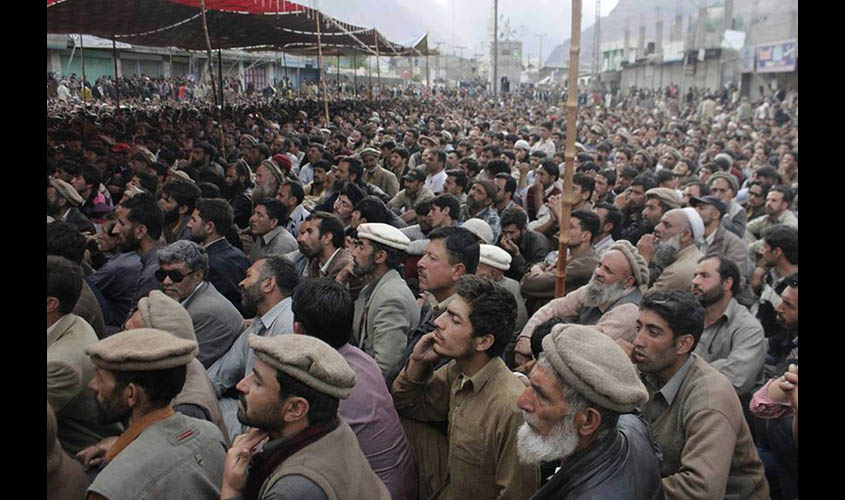Often used to woo foreign tourists to its mountains, Gilgit Baltistan, called Pakistan’s “soft face” is a neglected region where all-around shortages have reduced its people to ‘begging’ before the federal government.
From fuel to food to power, the shortages have triggered street protests in recent weeks by the local people. They have little by way of political power, share in the administration and no way out of its ‘anomalous’ situation in Pakistan’s polity.
The mood is getting anti-federal government. Elected representatives do precious little to bring relief to the local people. Belonging to national parties, they are busy attending their party conclaves in Islamabad and Lahore, writing in The Friday Times (February 28, 2023), Basharat Wakhani complains.
The Awami Action Committee leading the street protests has begun to say that the national parties have used Gilgit Baltistan as a ‘colony’ to be exploited by the federal authorities. This will continue unless they are rejected in elections.
Wakhani approvingly quotes renowned social scientist Dr. Akhtar Hameed Khan, who famously said that the people of Gilgit-Baltistan are unfortunate in the sense that they are sitting on gold, yet have to resort to begging.”
Gilgit Baltistan was forced into the Kashmir dispute after Pakistan invaded Jammu and Kashmir in 1947 and occupied a part of it.
Its position in Pakistan’s polity has since remained an ‘anomaly. Gilgit-Baltistan is treated as an administrative orphan in the Federation, and it is high time that concrete actions be taken to improve the egregious state of affairs,” Wakhani says.
In 1949, without the consent of the people, Gilgit-Baltistan was made part of the Kashmir issue by the government of Pakistan. Right from the beginning, “no local resident of Gilgit-Baltistan was considered competent. The region was ruled through the notorious Frontier Crimes Regulation (FCR). Only during Zulfiqar Bhutto’s rule, in the first half of the 1970s, the FCR was abolished in Gilgit-Baltistan.
During Ayub Khan’s rule, parts of Gilgit-Baltistan were illegally ceded to China. This was under the Sino-Pakistan agreement of 1963, which has a provisional status, pending the final settlement of the Kashmir dispute wherein India claims the entire Jammu and Kashmir.
Mubashir Hasan, an important minister in Bhutto’s cabinet, writes in his book ”The Mirage of Power” that during his visit to the region in 1973, he observed that the government accounts of Gilgit Agency were under the control of the Accountant General based in Peshawar, the provincial capital of North- West Frontier Province, now Khyber Pakhtunkhwa (KP).
For a very long time, GB and Federally Administered Tribal Areas (FATA), now merged with the KP, had a combined quota in federal government jobs. The Federal Public Service Commission website lists four provincial service commissions and one service commission for Azad Jammu and Kashmir. To date, Gilgit-Baltistan, which was made part of the Kashmir issue does not have a commission of its own.
Constitutional and political rights need to be given to the locals. Gilgit- Baltistan’s representation in the Senate and National Assembly must be ensured. The legislative assembly of Gilgit-Baltistan must be given more powers as an impotent assembly is of no use to the common masses.
Wakhani points out that the first university in Gilgit-Baltistan was established in 2002, fifty-five years after Pakistan’s creation. The region still does not have any engineering or medical universities.
The first governor, appointed only in 2009 was non-local. “Until now, no local of Gilgit-Baltistan has served as its Chief Secretary and Inspector General of Police,” he points out.
“The bureaucracy and its haughtiness can be observed from the recent case of an Assistant Commissioner in district Hunza who used derogatory language and closed down a family-run restaurant, only because he was not given a discount.”
“In 2018, the Chief Secretary of GB was seen disrespecting a local who was asking for the services of a gynaecologist at a local medical facility in the Baltistan region. Besides that, the regular transfer of bureaucrats in different departments is another serious issue that causes problems for service delivery in the region.
Ilhan Niaz, a professor at Quaid-e-Azam University Islamabad states that between 1994 and 2023, the post of Secretary, Education saw 26 changes. In the last five years alone, the post saw 10 changes.
Wakhani alleges that the lawmakers of the ruling party in Gilgit-Baltistan “have become impotent because the federal government, formed through a makeshift alliance of parties, has curtailed their project funds.”
thepakmilitarymonitor.com

